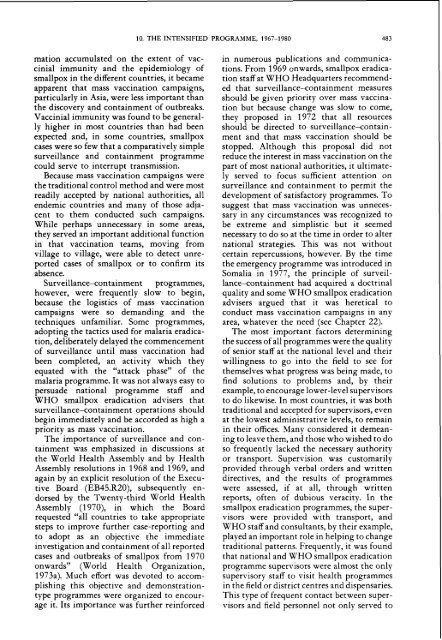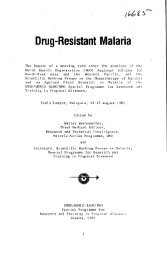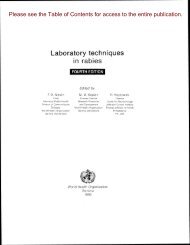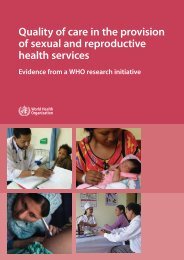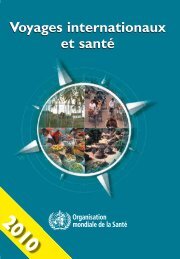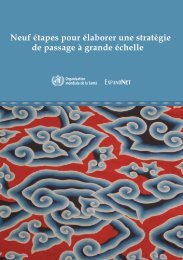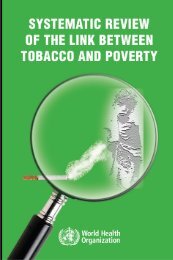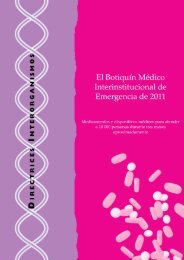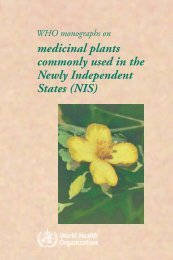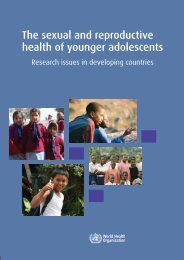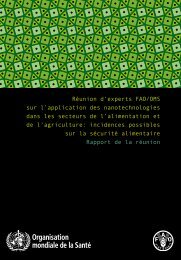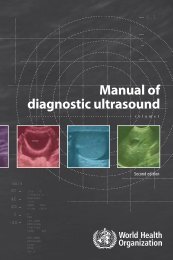smallpox eradication - libdoc.who.int - World Health Organization
smallpox eradication - libdoc.who.int - World Health Organization
smallpox eradication - libdoc.who.int - World Health Organization
You also want an ePaper? Increase the reach of your titles
YUMPU automatically turns print PDFs into web optimized ePapers that Google loves.
10. THE INTENSIFIED PROGRAMME, 1967-1 980 483<br />
mation accumulated on the extent of vaccinial<br />
immunity and the epidemiology of<br />
<strong>smallpox</strong> in the different countries, it became<br />
apparent that mass vaccination campaigns,<br />
particularly in Asia, were less important than<br />
the discovery and containment of outbreaks.<br />
Vaccinial immunity was found to be generally<br />
higher in most countries than had been<br />
expected and, in some countries, <strong>smallpox</strong><br />
cases were so few that a comparatively simple<br />
surveillance and containment programme<br />
could serve to <strong>int</strong>errupt transmission.<br />
Because mass vaccination campaigns were<br />
the traditional control method and were most<br />
readily accepted by national authorities, all<br />
endemic countries and many of those adjacent<br />
to them conducted such campaigns.<br />
While perhaps unnecessary in some areas,<br />
they served an important additional function<br />
in that vaccination teams, moving from<br />
village to village, were able to detect unreported<br />
cases of <strong>smallpox</strong> or to confirm its<br />
absence.<br />
Surveillance-containment programmes,<br />
however, were frequently slow to begin,<br />
because the logistics of mass vaccination<br />
campaigns were so demanding and the<br />
techniques unfamiliar. Some programmes,<br />
adopting the tactics used for malaria <strong>eradication</strong>,<br />
deliberately delayed the commencement<br />
of surveillance until mass vaccination had<br />
been completed, an activity which they<br />
equated with the "attack phase" of the<br />
malaria programme. It was not always easy to<br />
persuade national programme staff and<br />
WHO <strong>smallpox</strong> <strong>eradication</strong> advisers that<br />
surveillance-containment o~erations should<br />
begin immediately and be accorded as high a<br />
priority as mass vaccination.<br />
The im~ortance of surveillance and containment<br />
was emphasized in discussions at<br />
the <strong>World</strong> <strong>Health</strong> Assembly and by <strong>Health</strong><br />
Assemblv resolutions in 1968 and 1969. and<br />
again by an explicit resolution of the Executive<br />
Board (EB45.R20), subsequently endorsed<br />
by the Twenty-third <strong>World</strong> <strong>Health</strong><br />
Assembly (1970), in which the Board<br />
requested "all countries to take appropriate<br />
steps to improve further case-reporting and<br />
to adopt as an objective the immediate<br />
investigation and containment of all reported<br />
cases and outbreaks of <strong>smallpox</strong> from 1970<br />
onwards" (<strong>World</strong> <strong>Health</strong> <strong>Organization</strong>,<br />
1973a). Much effort was devoted to accomplishing<br />
this objective and demonstrationtype<br />
programmes were organized to encourage<br />
it. Its importance was further reinforced<br />
in numerous publications and communications.<br />
From 1969 onwards, <strong>smallpox</strong> <strong>eradication</strong><br />
staff at WHO Headquarters recommended<br />
that surveillance-containment measures<br />
should be given priority over mass vaccination<br />
but because change was slow to come,<br />
they proposed in 1972 that all resources<br />
should be directed to surveillance-containment<br />
and that mass vaccination should be<br />
stopped. Although this proposal did not<br />
reduce the <strong>int</strong>erest in mass vaccination on the<br />
part of most national authorities, it ultimately<br />
served to focus sufficient attention on<br />
surveillance and containment to permit the<br />
development of satisfactory programmes. To<br />
suggest that mass vaccination was unnecessary<br />
in any circumstances was recognized to<br />
be extreme and simplistic but it seemed<br />
necessary to do so at the time in order to alter<br />
national strategies. This was not without<br />
certain repercussions, however. By the time<br />
the emergency programme was <strong>int</strong>roduced in<br />
Somalia in 1977, the principle of surveillance-containment<br />
had acquired a doctrinal<br />
quality and some WHO <strong>smallpox</strong> <strong>eradication</strong><br />
advisers argued that it was heretical to<br />
conduct mass vaccination campaigns in any<br />
area, whatever the need (see Chapter 22).<br />
The most important factors determining<br />
the success of all programmes were the quality<br />
of senior staff at the national level and their<br />
willingness to go <strong>int</strong>o the field to see for<br />
themselves what progress was being made, to<br />
find solutions to problems and, by their<br />
example, to encourage lower-level supervisors<br />
to do likewise. In most countries, it was both<br />
traditional and accepted for supervisors, even<br />
at the lowest administrative levels, to remain<br />
in their offices. Many considered it demeaning<br />
to leave them, and those <strong>who</strong> wished to do<br />
so frequently lacked the necessary authority<br />
or transport. Supervision was customarily<br />
provided through verbal orders and written<br />
directives, and the results of programmes<br />
were assessed, if at all, through written<br />
reports, often of dubious veracity. In the<br />
<strong>smallpox</strong> <strong>eradication</strong> programmes, the supervisors<br />
were provided with transport, and<br />
WHO staff and consultants, by their example,<br />
played an important role in helping to change<br />
traditional patterns. Frequently, it was found<br />
that national and WHO <strong>smallpox</strong> <strong>eradication</strong><br />
programme supervisors were almost the only<br />
supervisory staff to visit health programmes<br />
in the field or district centres and dispensaries.<br />
This type of frequent contact between supervisors<br />
and field personnel not only served to


